Erstellt am: 25. 4. 2015 - 00:25 Uhr
The book you dream of reading
Reality Check Special
Listen to a Reality Check Special with Johnny Bliss and many writers, in the Unesco city of literature and capital of Iceland, Reykjavik, at the second annual Iceland Writers Retreat.
Saturday, April 25th, 12-13, and afterwards seven days on demand.
As the seventh plane to ever transport me to Iceland slowly began its descent to Reykjavik, I stared out at the grey carpet of clouds floating beneath us and asked myself, what, exactly, am I doing here again?
Akin to many romances in our lives that start with a short burst of passion, only to later relax into comfortable familiarity and - if we're unlucky - boredom, my visits to Iceland had lost something of the magic that had so inspired me on my journeys of discovery back in 2009 and 2010.
That sense of wonderment and adventure had gradually faded into a pleasant desire to merely go to this café or visit that person.
There was absolutely nothing wrong with that, but it still begged the question: what exactly have I been spending so much time and money to accomplish, that could not have been accomplished closer to home?
This year's justification was, of course, the Iceland Writers Retreat (IWR).
With featured authors including Barbara Kingsolver, Linn Ullmann, John Vaillant, Adam Gopnik, and the Icelandic poet and lyricist Sjón, and any number of intriguingly named writing workshops (see below), this was an exciting chance to revisit a familiar place with a new context.

V.R. Derr/J. Bliss, 2015
At least this is what I kept telling myself to keep at bay the other, more absurd notion, that I was simply contriving to return to Iceland because this is what I always do, and I'm nothing if not a creature of habit.
As if to gently brush aside these thoughts as mere byproducts of a tendency to overthink, I became distracted by what at first appeared to be more grey clouds hovering strangely high above their compatriots.
As my eyes focused, I quickly came to realize that this amorphous shape was neither grey, nor was it a cloud. Rather like a column of ghostly dancers welcoming us to Iceland, what quickly became shimmering, weaving green illuminations were none other than the Aurora Borealis.
My mind went quiet.
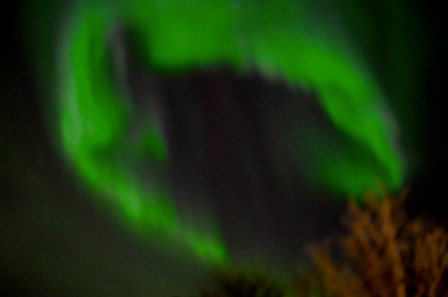
Victoria Derr, 2015
Preparation - Day 0
The awe and joy of witnessing the Aurora from so high up, was quickly tempered by the sobering realization that my favourite café in Reykjavik, the hemmi og valdi, had been shut down, and the interior design so thoroughly transformed as to wipe nearly all trace of it from the city.
The world had been turning without me. Friends, I discovered, were moving house, moving city, marrying, having children. Whether I liked it or not, I would have to wake up from my comfortable, familiar, unchanging dream of Iceland. Like all homes eventually do, it was proving to be an apparition.
It was in this slightly alarmed and disoriented state of mind that I walked through the city centre in my favourite Icelandic jumper, and was abruptly swallowed whole by a passing storm. Thus, when I finally arrived at the venue hosting the retreat (the Hotel Reykjavik Natura), I was not only addled, disconcerted and uneasy, but also extremely wet!

Johnny Bliss, 2015
I was there to meet the IWR co-founders, Eliza Reid and Erica Green, to sort out final registration details and conduct a short informal interview.
* - yes, I've been looking at a thesaurus.
Despite the fact that, on top of my above symptoms of rattled perturbation*, I now smelled like wet sheep, I think our interview went off pretty well.
Interview: Eliza Reid / Erica Green
When I first met the two of them there at the hotel, after months of on-off digital correspondence, I almost felt bad for asking for an interview, when there was clearly so much yet they had to sort out, so many things yet to organize, so many strings to pull to keep the marionette dancing.

Roman Gerasymenko / IWR, 2015
Organizing a big event is never easy. Although the IWR have kept the numbers down to about 90 participants (including volunteers) and 10 authors this year, for each individual participant there would be a whole unique program to keep track of, not to mention the individual needs of each of the featured authors.
I realized all of this just from the first couple minutes of watching Eliza and Erica coordinate things in the lobby. They pretty much had to field and fend people off almost continuously. Despite this, we did manage to find a few minutes and a quiet spot to have a chat.
Their chemistry, comfort, and mutual familiarity made them seem almost like sisters (or at least co-conspirators), often finishing each other's sentences and presenting a shared front of mutual sentiment, to the point that listening to the audio later, I wasn't always entirely sure who was talking when. It was easy to see why they would choose to work together.
This is a very streamlined excerpt of a transcript I made of our interview.
Please note that I only wrote the transcript after I had already edited the raw audio to produce a couple of radio pieces, which makes it even more streamlined and less objectively 'true'.
By serious journalistic standards, that makes this transcript practically fiction.
By literary standards, however, I think it makes the cut. (So we're going to go with those standards.)
ME: Why Iceland?
ELIZA: We had this held here because Iceland adores writers, and is a wonderful, inspirational environment to have this sort of retreat. And the fact that we're organizing it and live here makes it very easy for us.
ERICA: I flew to San Francisco for a writer's conference, and when I returned, I said to her: 'why did I fly around the world, halfway around the world, for a writer's conference? We should do one here!' [...] and eighteen months later, we had our first retreat. Now we're on our second!
ELIZA: Writing as a profession is really respected here.
ERICA: Iceland is known as the land of the sagas. There's a saying in Icelandic (and I won't try to do it for you in the Icelandic), that everyone has a book in their belly.
ELIZA: People should really see attending this event as a starting point, not as an end in and of itself.
First Glimpse of Authors: The Nordic House
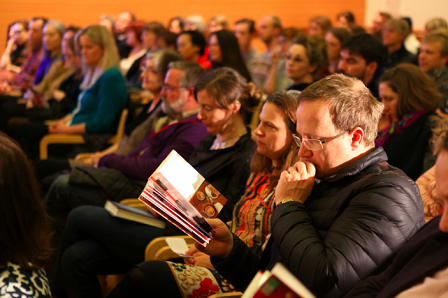
Roman Gerasymenko / IWR, 2015
Before the IWR really began in earnest, there was one free public event where all the featured authors (with the exception of Linn Ullmann, who arrived the following morning) read segments of their work.
Barbara Kingsolver read a charming story about sewing with Icelandic wool; Canadian travel writer Marcello Di Cintio read a gripping little piece about riots in Belfast; the American John Vaillant shared an excerpt of a larger work wherein an illegal immigrant from Mexico gets stranded in a water tank; young British-American writer Taiye Selasi was a real treat, performing a highly rhythmic (nearly to the point of being slam poetry) excerpt from her debut novel, 'Ghana Must Go'; Adam Gopnick used the seemingly trivial topic of baking bread to shine a torchlight into the relationships we have with partners and family; Alison Pick had a sobering piece about living with depression; Ruth Reichl amused us with the story of a relative who had no qualms about serving guests food that had gone off; and Icelandic author Sjón, er, read something in Icelandic. "Enjoy the sound of it," he implored us (somewhat cheekily, I thought).

Nordic House, 2015
This first evening in the Nordic House, although public, set the tone quite well for the overall atmosphere of the IWR. Something very special about events like this is the close proximity you are granted to the, for lack of a better word, celebrities in attendance. There is no one standing in the way, saying you cannot talk to this or that person; everyone is very approachable. You get to engage as fellow human beings.
The Book You Dream of Reading - Part 1 (Sjón)

Roman Gerasymenko / IWR, 2015
At first I wasn't sure what to make of Sjón. His choice to read a piece in Icelandic to a room full of English-speakers (when he has plenty of recent work that has been translated) could either be the mark of a man with a fantastic sense of humour, or it could be... well, mildly strange.
But in the context of his workshop itself, Sjón won me over.
For one thing, he's just such a charming and personable guy; he has that dry Icelandic wit, mixed with a real tendency toward self-deprecating humour and honesty. At one point he forgot the name of the workshop, and laughed with us at the ridiculousness of the very long title. Later on, he realized his coat was covered with cat hair, and openly lamented that he had forgotten to clean it off before coming in to work.
The concept behind the workshop, The book you dream of reading is the book your readers should be reading, can be summed up easily.
What has made us the readers we are? Sjón asked us in our workshop space, before proceeding to answer his own question.
What forms us as readers, he said, is maybe not high literature, but all sorts of different cultural experiences we had when we were kids, and those experiences are usually not based in the so-called 'high culture', but in our participation in pop culture, in 'low culture'.
To unpack that statement, what he was saying was that we might just have been influenced more by our childhood toys, TV shows, or video games, than we were by the great masters of literature, theatre, or mythology that are more often (and less shame-facedly) cited as influential.
The excitement that we experience there is something that I think should translate into our writing as literary authors, he continued.
I could relate.
In my case, I was excited by zeppelins in video games I used to play growing up, I told him, thinking of the game Final Fantasy 3/6(jp), which influenced a lifelong fascination I've had with zeppelins and airships, and eventually manifested itself in my Space Zeppelin radio play series.
Yes! Sjón agreed wholeheartedly. This is where we come from. It's good to remember it, you know, to allow it to fuel what we are writing today.
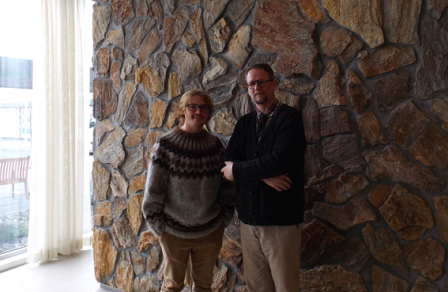
Johnny Bliss, 2015
Getting to Know You - Part 2 (Marcello Di Cintio)

Nordic House, 2015
Without trying to be facetious, I've had the feeling since I first met him that, in some respects, Marcello Di Cintio - the Calgarian travel-writer who, on paper, I probably would have the most in common with of anyone at the conference - would be a very hard person to get to know.
He is an extremely amicable, (typically Canadian) polite fellow - but he is also very reserved, from my perspective. He will gladly and articulately tell you all the press release stuff and every soundbyte he gives you sounds really excellent - easy to broadcast, sharp, to the point.
I also feel like he has put a certain wall up; a clearly-defined, rarely-crossed boundary line between "personal" him and "professional" him.
* - Marcello has two workshops, one of which is called 'Getting to Know You: A Profile Writing Workshop".
The one I attended was in the form of a straight-up lecture, delivered on stage as a kind of monologue, followed by a short Q&A.
Getting to know him - the personal human being beyond all that, could be a bit of a challenge. I would need all the tools in my toolbox to accomplish this task. So I signed up for one of his workshops*, to teach me how.
Afterwards, we sat down for an informal chat, to go over some of the themes he talked about in the workshop/lecture.

Victoria Derr, 2015
Marcello seemed to be a very earnest, serious guy. I decided that my first goal would be to get him to crack a smile.
Marcello, I told him straight after the workshop, My plan is to transform you from a real person into a compelling literary character that I describe, characterize, and mythologize. Any tips for how I should do this?
* - Mission accomplished!
He laughed*. You could find a more interesting character to mythologize!
Then, with an intent, getting-down-to-business expression, he continued: I think all we want as human beings is to tell our stories, and so what we do as a journalist is essentially to stand back, and let the subject kind of tell the stories that he wants to tell. Teasing a little more out, [...] spending some time and getting to reveal things about themselves that they might not have, had you not asked the right questions.
He paused, gave me a serious look, and abruptly his mouth contorted into a silly grin. How you're going to do that with ME, I have no idea!
I decided to try a different tack. Would you know any techniques also potentially applicable for transforming your own, let's say, somewhat unknowable self into a character you can actually write about? That's right, Marcello. I'm cheekily trying to get you to do the work for me. It's very hard to know what persona that actually is, because you are always that self.
He took a long moment to think about this before answering.
Certainly all travel writing is auto-biographical, he said. The writer is always present somewhere, right? We don't have that luxury that maybe a novelist has of hiding behind his narrator or his main characters. We HAVE to be there. So first of all, we have to ACCEPT the fact that we're always there, and then we should craft ourselves a persona that exists upon the page.
That's an evasion, Marcello! I pressed on. So, maybe you don't want to put too much of yourself into the story.
Smoothly, Marcello: Yeah, absolutely. People ask me sometimes, "How much I, how much me, do I put in my stories?" and the answer to that question is, the exact right amount. [...] It's a difficult balance of knowing what is too much and what is just enough.
* - Although I have heard rumours to the effect that he was brought up in the circus by a group of Bulgarian gypsies, and eventually emigrated to Canada as a spy for the Russian Secret Service.
Also, sources tell me that he bakes a killer apple strudel.
Conclusion: I may not have gotten any closer to being able to properly characterize or even understand this enigma of a man*, but on the plus side, I got some pretty sound writing advice.
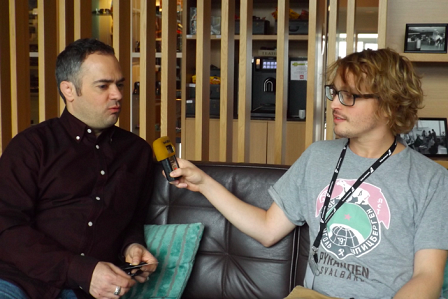
Victoria Derr, 2015
Intermission: The Golden Circle
One of the three main days of the retreat was very unlike the other two; instead of sitting in group workshops and discussing the many and varied aspects of literary writing, we all boarded buses and took a tour around Iceland's famous Golden Circle.
This included stops at the site of the old Viking Parliament at the UNESCO-listed Þingvellir National Park, the geyser from which all geysers are named (Geysir), a big ol' waterfall called Gullfoss, the cathedral at Skálholt, and the former home of the Nobel Prize-winning author, Halldor Laxness.
Unfortunately, the weather gods were not with us.
Or maybe that is fortunate. Experiences are often more memorable when things don't go completely according to plan... There was a bit of a strange omen at the beginning when our bus broke down before we even left Reykjavik, and we needed another one to come pick us up.
Our guide on the bus throughout was the lovely, charming, and self-effacing Icelandic husband of Eliza, Guðni Th. Jóhannesson, who is a historian and writer specializing in Icelandic history.
It is to his credit that, as weather conditions worsened through the day, he managed to keep us all in a good mood with his own sunny demeanour (perhaps one needs a little bit of a sunny demeanour to survive Iceland's long, dark winter months).
After a relatively tame trip to Skálholt, where local novelist and playwright Einar Kárason spoke to us about the Icelandic civil war over donuts and coffee, we re-boarded the bus and our real journey began.
Skálholt
It was over at the famous geyser Geysir, that we got our first hint of what was to come. Although the sun was still out when we exited the bus, the difference in weather could not be more enormous.
As we were disembarking, I saw the wind push one author into the arms of another, resulting in the two of them toppling into another novelist. We all assumed bracing positions to avoid getting knocked over, and had to sort of crabwalk through the howling gusts toward the Hotel Geysir, where we were shortly to be rewarded for our efforts with a very good buffet lunch.
A small mob scene formed in front of the thick wooden door to the hotel as several of us struggled to pull it open. My hat flew off of my head, and as I turned to pick it up, the wind threw it several metres away, where it fortunately landed behind a stone pillar. I started toward it, and with the help of the wind, was unceremoniously hurled into the very same stone pillar, onto which I clung for dear life for several embarrassing seconds.
All of this happened over a timespan of no longer than a minute, and required crossing a distance of about maybe fifteen metres.
Our post-lunch pilgrimage to the famous Geysir, after which all geysers were subsequently named, was going to be much more of an ordeal...
Geysir
I'd seen Geysir before, but never in such wind. I suppose, because we really had to work for it, this was more rewarding!
However, I think we were also all quite happy to get back on that bus. Our next stop was the famous and beautiful waterfall Gullfoss!
Gullfoss (Waterfall)
Next up was the old seat of the saga-era Viking parliament, Þingvellir. It's a very intriguing and historic place, and well worth a visit.
That said, most of what we saw on this visit was a whole lot of snow and rocks; but the experience was worth it for the feeling of ruggedness as we hiked through what might as well have been the arctic tundra.
Þingvellir National Park
Gljúfrasteinn (Home of Halldor Laxness)
Our last stop for the day was a pleasant change from all of the other stops; Gljúfrasteinn, the former home of Nobel prize-winning author Halldor Laxness, has been converted into a museum since his death in 1998, but it has been left largely as it was when he lived there. Stepping inside, I immediately had the feeling of walking into the warm and comfortable home of, say, a favoured grandparent. The house felt haunted, in all of the best ways, by the positive energy of this incredible man.
The satirical author Andri Snær Magnason joined us there, and read funny excerpts from several of his books, while we sat there, warmed up, and soaked in the atmosphere.
Apparently, we were the lucky ones. On the way back, we learned that several roads had been closed behind us (due to weather), meaning that the other bus full of writers had to make a very long detour to return, including a stop to help push several cars out of snowdrifts and the like.
Everyone seemed pretty beat by the end of the day... but as they say, the show must go on. In real life, we continued on to to a pub night and poetry reading, and shortly thereafter, the Writer's Retreat ended.
In this nonlinear web article, however, we will go back in time instead, and visit two more of the writing workshops with me.
This was just an intermission!
Hearing Voices - Part 3 (Taiye Selasi)
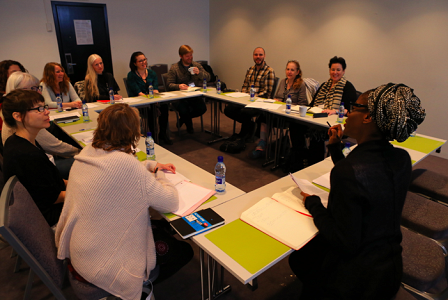
Roman Gerasymenko / IWR, 2015
I'd been very much looking forward to attending this workshop ever since I'd seen Miss Selasi reading that awesome rhythmic piece over at the Nordic House. This, despite my being relatively unclear on what exactly the workshop was going to be about.
Hearing Voices was all about using different cases (ie. I, you, he, we) to show how differences in perspective can drastically affect and change the mood or 'colour' of a piece.
So he entered the classroom and saw Taiye sitting there.
You followed shortly behind him, and so did I.
Each of you took your seats, and as we all sat there looking at each other, we all at once realized that this would be far less awkward if they would simply greet each other.
* - Or do you rather think I get the picture?
And I think you get the picture*.

Roman Gerasymenko / IWR, 2015
Taiye's workshop was definitely a highlight, owing as much to her joyful personality, as to the bizarre fun of being obliged to write (and read) little snippets of narrative in a variety of perspectives that we would seldom use, under normal circumstances.
Quite possibly one of the best parts of bringing myself to this writing retreat has been the opportunity to share ideas, even ones which might superficially seem obvious, with so many likeminded people, many of whom are established in the very fields I would like to enter.
And then there are the writing exercises, such as the one at the heart of the next (and last) of the writing workshops I will detail here.

Roman Gerasymenko / IWR, 2015
I Remember - Part 4 (Linn Ullmann)
Quite possibly the highlight of the whole retreat for me was the workshop I had with the Norwegian novelist Linn Ullmann, I Remember.
The idea behind the workshop was to focus in on the memories, and images within the memories, which had the most resonance for us, and channel these images and feelings into powerful fiction.
Robert Olen Butler once told me, [To be] entirely able to go without flinching, [or] averting your eyes, into your roiling unconscious, where it's not even literal memory anymore, and things have broken themselves down into sensual parts... that's scary. But if you haven't found the courage to do that with yourself, you are so far from being able to authentically enter into [a fictional character]'s unconscious, who is quite different from you.
Those words stuck with me, and may have had something to do with the fact that I felt so drawn to Linn's workshop, despite never having read any of her books (yet). I may have had no pre-existing relationship to Linn Ullmann the writer, but Linn Ullmann the person seemed so clear on the value (for us, as writers) of the hidden scar tissue and resonant feelings hiding away in our memories. If she puts the same authenticity and purpose into her writing, I have little doubt I will be a fan.

Johnny Bliss, 2015
Memory is an amazing storyteller in itself, she told me later. I think that is our natural organ of storytelling, that we're born with. Most memories [are] reconstructive anyway. I mean, science [has proven] that most of the things we experience we actually forget. Memory fills in the gaps. For writers, obviously, memory is both like a physical organ like a heart or liver, it's vital to our survival. But it's also an organ as in, an instrument that we play on.
Central to the workshop was a powerful writing exercise that was also called I Remember.
The workshop has its name after a beautiful little American classic book called "I Remember" by Joe Brainard, Linn said. [He was] actually an artist first and foremost... he died from AIDS.
Every paragraph or almost every sentence in the book begins with the words "I Remember" and through this book, you get a whole sense of a time, and a place, and a man.
So I ask [participants to take] eight minutes and write every sentence, or small paragraph, beginning with the words "I Remember".
Some really beautiful texts came out of that exercise, because there's so little time to actually do it. They were like almost finished poems or stories, in the way they came together.
In that workshop with me was a woman from Dhaka, Bangladesh, named Sanjana Sadique. She is the successful author of an English-language children's book called "Tiger, Tiger". Like me, she found the I Remember exercise to be both powerful and therapeutic.

Sanjana Sadique, 2015
SANJANA: Personally, I don't like talking about my past, but yesterday in the workshop, I realized that there are very deep and meaningful things in my past that will inspire other people [if I write about them]. I was remembering my trip from Bangladesh to Iceland. We had a stopover in Amsterdam for a day. So I just started talking about my taxi ride to the airport from Amsterdam, and it ended up into, you know, me looking back at my past. Surreal in a way, because I had no idea that it would connect.
--
I remember feeling a little upset before getting in a taxi in Amsterdam.
I remember wanting to come to Amsterdam as a student, but never having enough money to do so.
I remember being a student in London, and having this intrinsic need to travel the world.
I remember not feeling like I belonged to just one place, but that I belonged everywhere I went.
I remember suffering from identity crisis as a child, because I had no idea who my parents were.
I remember being strong one sudden day, to let go of all those feelings.
I remember feeling so empowered one day, nothing could get into my way.
I remember feeling happy, on my way to the airport in that taxi.

Sanjana Sadique, 2015
ME: Thank you for sharing. Do you want to hear mine?
--
I remember random strangers smiling at me as they walked by, and I'd forgotten why. I remember waking up to the sound of thunder, and having for a very long moment, no idea where I actually was.
I remember waking up and being sure that I was on the deck of a boat.
I remember the nastiness of a macaque monkey, searching for something to eat on a boat. I remember seeing a plane burning in the sky.
I remember rain, fireworks, and the amorphous grey blob of the sky.
I remember a bottle rocket bouncing off the bottom of my foot.
I remember the intense scent of smoke entering my helmet, to the point where it was difficult to breathe.
I remember being paralyzed with fear, that if I would move, I would fall off the boat.
--
Now I remember a bloody excellent trip to Iceland, which transcended my previous visits to the country, and managed to be special in its own right.
I remember a really great writers retreat. ♥

Johnny Bliss, 2015
FM4 Reality Check Special on Saturday, April 25th
Listen to a Reality Check Special with Johnny Bliss and many other writers, in the Unesco city of literature and capital of Iceland, Reykjavik, at the second annual Iceland Writers Retreat.
Saturday, April 25th, 12-13, and afterwards seven days on demand.


